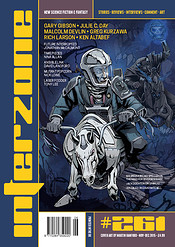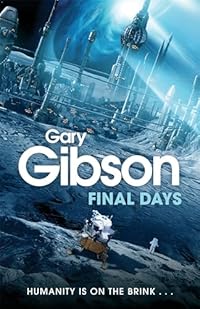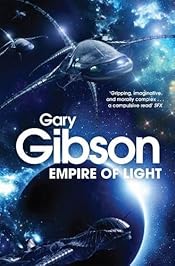Europa Deep by Gary Gibson
Posted in My ParSec reviews, Reading Reviewed, Reviews published in ParSec, Science Fiction at 12:00 on 23 April 2024
Brain in a Jar Books, 2023, 353 p. Reviewed for ParSec 9.
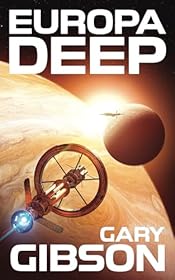 In the aftermath of an extremely virulent virus called the Whispers, which may or not have been man-made, optimised humans (Opts) such as Cassie White are widely held to have had something to do with it and subject to prejudice as a result. Somewhere around the same time there was also an AI war after which the Chinese People’s Republic was replaced by the New Chinese Republic (NCR.)
In the aftermath of an extremely virulent virus called the Whispers, which may or not have been man-made, optimised humans (Opts) such as Cassie White are widely held to have had something to do with it and subject to prejudice as a result. Somewhere around the same time there was also an AI war after which the Chinese People’s Republic was replaced by the New Chinese Republic (NCR.)
Cassie’s optimisation has given her an overwhelming need to be in space. Unfortunately, a side effect of her treatment was to be the sufferer of occasional blackouts. One such led to an accident on the Moon in which a coworker died. Drugs can control the symptoms but are not fully trusted – either by her or the wider world. She had been turned down for the first expedition to Jupiter’s moon Europa, on which her brother Chris was one of the crew. Its fate is shrouded in mystery and, most likely, disaster. Hence Cassie starts the book having to work underseas, the closest she can feel to the space experience. To her surprise a politician called Ketteridge, who had previously stirred up resentment against Opts, comes to her in secret with a proposition. His bait is a video of someone walking across the surface of Europa (could it be Chris?) and he wants her to join a second expedition to that moon to recover information valuable to him.
Earlier than our introduction to Cassie though, Gibson pulls off a similar sort of trick to the one Alfred Hitchcock gave us in Psycho, as a result of which the reader knows that two other operatives on the ship, Sally Braemar and Jeff Holland, are not who they claim to be.
Not that suspicion is lacking anywhere on board. Cassie’s replacement of the original crew member has flummoxed everyone, Commander Javier hates her for being responsible for that death on the Moon and fears a relapse on her part so keeps her in suspended animation throughout the trip and her subsequent involvement to a minimum, the others resent Braemar and Holland as possible spooks. Such a closely tied group containing possible traitors makes this aspect of the novel resemble an Alistair MacLean book. And unbeknown to them all, Marcus, Cassie’s last boyfriend, who when about to die of the Whispers had his brain downloaded into an AI (a group also now universally vilified and feared due to the war) has infiltrated his way on board and can observe them all through the ship’s robot repair machines. Plus a Chinese ship having on board another former lover of Cassie, a connection of which Javier is aware, is also on the way to Europa.
And the Yatagarasu, an AI controlled ship which made an unscheduled stopover at Europa, has since vanished from human ken.
All in all, plenty to keep us intrigued and turning the pages.
The remainder of the book deals with the obstacles Cassie has to overcome in getting to Europa’s sea floor in her search for Chris and with what she finds once she gets down there.
Gibson is good on the mechanics of underwater exploration and his descriptions of the extra-terrestrial life in Europa’s ocean do tickle the sense of wonder. A touch of mysticism, if not outright fantasy, tinges the fate of the first expedition, though.
Europa Deep is good solid (well a fair bit of liquid actually) stuff, ticking quite a few boxes. It will scratch the itch of the SF buff, ought to satisfy the thriller reader and even tease the horror taste buds.
The following did not appear in the published review.
Pedant’s corner:- “perhaps there were having a bad day” (they were having,) “she’d be damned if she’d spend one more time in this man’s presence” (I don’t see the need for that ‘one’. One more minute?) “ a few other of you” (a few others of you.) “There was a cheap hotel not from where she was” (not far from where,) Marcus’ (many times. Marcus’s, which did appear once,) Veles’ (many times, Veles’s,) “the cry of cicadas” (cicadas plural, so therefore ‘cries’,) “zero gravity” (technically there is still gravity; the more accurate term is free fall,) Karman Limit (elsewhere Kármán line.) “She pictured Braemar bursting into the lander at that moment, a wrench gripped in one hand and his eyes full of manic hatred” (the character Sally Braemar is female. The male was called Holland,) a missing colon between a message source identifier and its content. “Europa’s dark side” (I assume this meant the side of Europa permanently not facing Jupiter,) “went work in the NCR” (went to work,) N/O2 supply (strictly N2/O2 supply, though, whatever, the 2 ought to be a subscript,) skeptically (sceptically,) “as much to break the silence than anything” (as anything,) “none of them were Chris” (none of them was Chris.) “Rust and grime streaked its outer shell” (Would subsurface exploration suits for use on Europa really be made of iron?) span (spun,) Chris’ (Chris’s,) Necropolis’ (Necropolis’s.)
 ParSec 9 has been published and can be purchased
ParSec 9 has been published and can be purchased 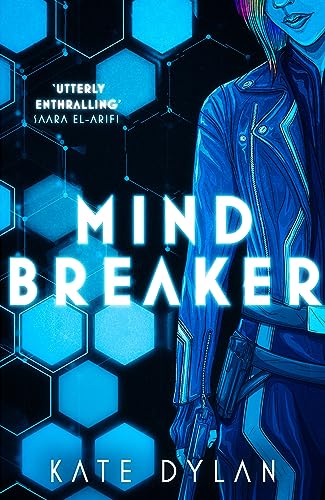
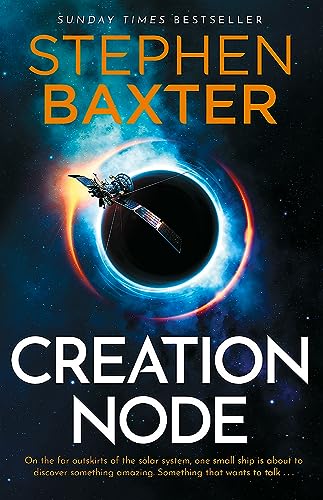 I have finished Gary Gibson’s
I have finished Gary Gibson’s  You may have noticed on my sidebar the book Europa Deep by Gary Gibson.
You may have noticed on my sidebar the book Europa Deep by Gary Gibson.